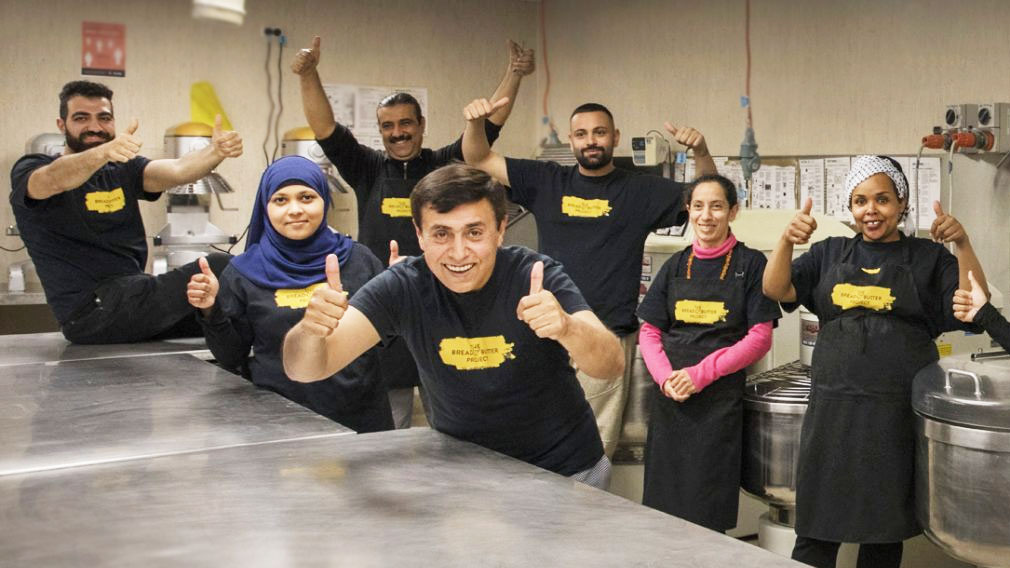Social enterprise comes of age in COVID recovery

Apprentices of social enterprise bakery The Bread & Butter Project, which trains refugees and asylum seekers to become qualified bakers. (Provided)
The social enterprise landscape is almost unrecognisable compared to when I started working in the sector 14 years ago.
At that time, not many people had heard of the term “social enterprise”.
But with the rise of exciting brands like Who Gives a Crap, Thankyou, The Bread & Butter Project and Humanitix, more consumers are becoming familiar with for-purpose businesses and choosing to support them by purchasing their products and services.
They realise the sense in using business as a force for positive social and environmental change, bridging the cracks in our systems to create better outcomes for people and the planet.
Yet while there are a growing number of good news stories out there, the social enterprise sector is still massively underleveraged in terms of the critical role it can play in building a more inclusive economy.
And that role has arguably never been more critical, as the economy begins to recover from the shock of COVID-19.
Although many indicators show the recovery is well underway, look behind the headline figures and you find a very mixed story.
One of the most heralded markers, the unemployment rate, has fallen below pre-pandemic levels, which is great news. But this masks the fact that underemployment is still high and those who are disproportionately affected are those who face the highest barriers to work such as young people, refugees and people with disability.
In fact, research by the Australian Council of Social Services and UNSW shows that inequality and poverty in Australia has increased since the pandemic began.
At the same time, Australia has skills shortages across many industries.
It’s within these cracks in the economic recovery where social enterprise can and should lead – particularly those which have become known as “work integration social enterprises” – or WISEs.
These businesses create training and jobs for Australians that face multiple barriers to the mainstream job market, helping to transition the most disadvantaged people into sustainable and meaningful work and, in doing so, helping to fill gaps in the jobs market.
What is a social enterprise? Here's an explainer.
As recognition grows of these win-win outcomes, the sector is experiencing a coming of age.
The momentum is unmistakable.
National collaborations have emerged helping pave the way for social enterprise to play a more central role in our economy and help shift the way consumers think about the role of business.
The sector now has representative bodies in all states and earlier this month a new entity, Social Enterprise Australia, was formed to progress work on a national social enterprise strategy to be released later this year.
A national sector-led initiative, called the WISE Hub, was recently established – backed by Westpac Foundation, which has been supporting WISEs for more than 16 years. The WISE Hub aims to strengthen the policy environment for the WISE sector so it can grow and help unlock greater economic inclusion.
And in September, Australia will host for the first time the Social Enterprise World Forum (SEWF) in Brisbane, supported by Westpac Foundation as a major partner, another galvanising force for the sector. First held in Edinburgh in 2008, SEWF’s goal is to grow the global social enterprise movement to accelerate the transition to a new global impact economy.
So, why, with all this momentum, is the sector still underleveraged?
This question was at the heart of discussions at the SEWF22 kick-off event held last week. Sector experts explored the challenges and opportunities, including the need to create a unified voice for the sector, and build a supportive policy environment and shared understanding of the value of social enterprise.
At the event, executive director of Social Enterprise Australia, Jess Moore, said despite their proven models, most work integration social enterprises still operate “on a knife’s edge”.
“While government pays service providers and employers for their role in tackling unemployment,” Moore said, “as these supports involve costs, this funding has largely not been available to WISEs, impacting their ability to scale and maximise the critical role they play.”
There are policy initiatives underway to address this issue, such as a pilot payment by outcomes model led by White Box Enterprises where social enterprises are paid for those they support into work.
But these discussions underscored that despite coming so far, there is still a long way to go for the sector to realise its full potential and cement its place as a legitimate part of Australia’s economy.
To get there, the sector needs champions across all areas of the economy, including those in the corporate sector.
Whether it’s through advocating for better policy, boosting procurement practices to target social enterprise, or sharing the stories of the value delivered by social enterprise, corporates can play a vital role.
Doing so will catalyse the change we all seek for a more equitable and sustainable future.
Westpac Foundation is a major partner of this year's Social Enterprise World Forum to be held in Brisbane in September 2022.


